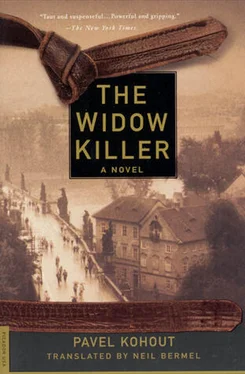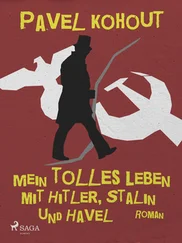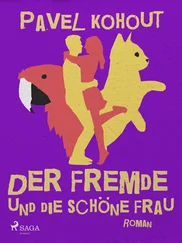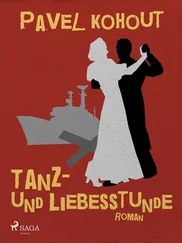“Pack up!” he told his men. “We’ll get our payback somewhere else. Anyone want to come with us?”
Out of sudden instinct he turned to the machine gunner.
“Sure!” the man responded eagerly; a remarkably pale fellow, he looked too skinny and weak to handle the long weapon on its tripod.
“You must be crazy!” the officer snapped at him. “Without you we can’t hold the barricade.”
“Then drop back,” the man scowled. “This gun nearly cost me my head yesterday and I don’t lug it around to shoot rabbits for fun. You don’t need weapons to retreat, anyway!”
“Cowboys!” the captain shouted at them, tears of rage in his eyes. “Just shoot up the town and move on, is that it? Our dead are on your conscience; there was no reason they had to die!”
A clearly audible “Hurraaaaaaah!” carried down from the hill.
As he led the way across the wet soil beneath the barricade, he nearly stepped on a Czech policeman whom a muddy young girl was trying to resuscitate. Drop dead, he wished malevolently.
The rain grew stronger as the battle slackened. And why not go uphill, it occurred to him. There’d be plenty of Germans to smoke out of their hiding places. In addition, the Czechs up there had just lived through an SS massacre and wouldn’t be as squeamish.
Then he remembered another place they could dry out in peace and quiet and maybe even repay another debt….
Like a fire that suddenly flares up from charred rubble, the war reappeared to surprise Buback again. He was taking a shortcut, a trail that led down beneath the old fortress to a railway bridge, when the previously isolated gunshots melded into the cohesive hum of battle from several directions.
Standing in the rain, he wondered whether he should go back; everything in him wanted to be with her. Logically, though, it would not solve anything. On the contrary, it meant forfeiting control over their lives and entrusting them to luck. Logic won out, but his inner turmoil remained; part of him could not stop feeling her fear.
This time he needed his letter of transit at nearly every barricade, and twice the bedraggled revolutionaries shook their heads over it before giving in. He would not be lucky enough to get there and back tomorrow as well. If he was to save Grete, he had to arrange it today.
On the way he listened closely for rumors. The most credible one was that a couple of German units billeted in Prague, whose commanders had formally capitulated in return for a promise of free unarmed passage out of the city, had feared revenge from a now armed populace, and tried to force their way through to a safe retreat.
In front of the police commissioner’s office he came across a familiar face. A broad-shouldered man looked inconspicuously around and informed him sotto voce that he was Mátlak from Morava’s group and was waiting here, at Beran’s orders; Buback should follow him at a distance. Soon they were alone under the shelter of a crooked Old Town passageway, and Matlák poured out his story.
Berán and Brunát, he revealed to Buback, had been removed from their post and placed under some sort of house arrest. Why? Buback was flabbergasted. Because! The Communists had taken over the Czech National Council; they claimed Beran’s acceptance of Vlasov’s help was a gamble deliberately meant to insult their Soviet allies, as were Beran and Brunát’s local agreements with the German commanders, which the Germans had broken without a moment’s hesitation. Beran’s message to Buback was that he could no longer do anything for him, his lady friend, or any other Germans. However, he still approved of any attempt to defend those decent and innocent German civilians, and hoped the majority of them would live to see peace without harm.
Could he speak with Beran’s replacement, Buback asked despairingly. The broken truces were no doubt provocations by dyed-in-the-wool Nazis, who thought nothing of saving their own skins at the expense of their defenseless fellow citizens and exposing them to the enraged Czechs’ vengeance. Matlák warned that it wasn’t advisable. The garage manager had been named revolutionary police commissioner; since yesterday Tetera had taken the hardest possible line against the Germans and their Czech helpers.
The garage manager, realized Buback; my God, our informant is now in charge! But who can I tell?
Matlák informed him that on both sides, the radicals had simply swept out the moderates. All they could do now was try to prevent the worst from happening. He was among the few who had learned to appreciate Buback; therefore he was risking this conversation and would be glad personally to keep helping him as long as he was able. I need to get hold of Detective Morava urgently, Buback requested. He went somewhere with some soup; yes, Matlák repeated to the amazed German, he had been there in the canteen when Morava and Litera had picked up a canister of soup and bread to take to someone.
Buback, of course, knew whom it was for. They must have just missed each other, so they would be long since gone from Grete’s, but he was grateful all the same. He would risk one more trip to Bredovská for fresh news of the German side’s intentions and then head back to Kav  í Hory; he couldn’t leave her alone any longer.
í Hory; he couldn’t leave her alone any longer.
“Please,” he finished, “if you believe we’re among those ’other Germans’ who want to atone for the havoc Germany has caused, tell Mr. Morava as soon as possible that I’ll be waiting for him at a familiar place.”
“The house on the hill?” Mátlak asked, and, seeing Buback startled, tried to calm him down. “I’m sorry, it just occurred to me; I’ll forget it right away. ..”
What occurred to Matlák could occur to others, said a fearful voice inside his head as he marched onward, showing the letter of safe conduct with its already invalid signature. At any cost he had to get Grete out of that place; it could become a deathtrap at any moment, and his only hope was Morava. Only? What about Meckerle?
Immediately he felt ashamed. Had he already sunk so low that he’d switch sides again? What set him apart, then, from Vlasov’s traitors, whom he’d found so contemptible? But was this really a defection? Didn’t he have the right, even the responsibility, to use any means available to save his love? If Meckerle could extricate himself and his men from this siege, the giant couldn’t refuse to take her along. But then if Buback wanted to appease his own conscience, there was only one way: He had to stay to the bitter end, whatever it might be.
Mired in thought, he reached Wenceslas Square. The last Czech crossing point not only accepted his pass, but even tried strongly to dissuade him from continuing. The Germans had gone on the rampage, picking up every Czech who appeared on the street. And a hidden sniper was firing on anyone who tried to cross over. Buback bet on speed and luck to avoid him, and won. Around the corner, however, he was arrested.
What should have been a trifling problem for Buback, of all people, turned into a surreal scene with an ever wilder script. Before he could even speak, two SS men tackled him like butchers grabbing a meat calf and shoved him over toward a handful of men they had evidently picked up before him. He could not find the courage to dig his Gestapo identification papers out from his socks and shoes in full view and decided to remain anonymous until a less awkward opportunity presented itself. Besides, personal testimony of how Germans treated Czechs in these critical hours could prove exceptionally valuable in his coming conversation with Meckerle.
Shortly thereafter a covered truck pulled up and the prisoners were herded under its tarpaulin. None of the Czechs made a noise, and their escort was menacingly silent, although the Germans’ gun butts proved more demonstrative. Buback sustained a sharp blow to the shoulder, but this only strengthened his determination to stay and observe what his kinsmen were doing.
Читать дальше

 í Hory; he couldn’t leave her alone any longer.
í Hory; he couldn’t leave her alone any longer.










